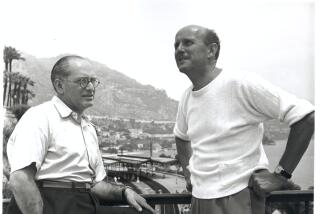Restored ‘The Life and Death of Colonel Blimp’ is set to screen
- Share via
“The Life and Death of Colonel Blimp,” Michael Powell and Emeric Pressburger’s 1943 epic tale of a British army officer, encountered countless obstacles over the last 70 years.
Prime Minister Winston Churchill didn’t want it made and even went so far as to visit one of the film’s stars to discourage him from doing it. Produced during the height of World War II, the British War Department refused to help the production, which was shot in three-strip Technicolor. The original negative was severely cut for the 1945 U.S. release and had developed mold.
But thanks to restoration funding by the Material World Charitable Foundation, the Louis B. MayerFoundation, Cinema per Roma Foundation and Martin Scorsese’s the Film Foundation, the Academy Film Archive has digitally restored the masterpiece to its original — and stunning — Technicolor, 163-minute glory. And Wednesday, the Academy of Motion Picture Arts and Sciences is presenting the West Coast premiere of “The Life and Death of Colonel Blimp” at the Samuel Goldwyn Theater.
Scorsese’s three-time Oscar-winning editor Thelma Schoonmaker (“Raging Bull,””The Aviator” and”The Departed”), who was married to Powell from 1984 to his death in 1990, was supervising consultant along with Scorsese. Since Powell’s death, she and Scorsese have worked together to restore films her husband made with or without Pressburger, most notably UCLA Film & Television Archive’s 2009 restoration of the directing team’s 1948 Technicolor masterwork “The Red Shoes.”
Schoonmaker will introduce “Blimp” on Wednesday evening. Because of its emotion and complexity, “Blimp” is Schoonmaker and Scorsese’s favorite Powell-Pressburger movie. “You never know what’s coming next,” she said. “He and I could watch it forever.”
It was inspired by David Low’s satiric cartoon character, “Colonel Blimp,” which featured a balding, overweight aging blowhard army officer. The film is a lovely, lavish romantic film that follows the life of Clive Wynne-Candy (Roger Livesey), a blustery old army veteran who began service in the Boer War and is leading the Home Guard during World War II.
A very young Deborah Kerr plays the woman he loved and Austrian emigre Anton Walbrook plays Wynne-Candy’s friend, German officer Theo Kretschmar-Schuldorff, who married the woman he loved. It was Walbrook who received the visit from Churchill.
Schoonmaker recalled Pressburger said that the film caused some more controversy when its production was announced because Churchill had been “whipped up” byBritain’sWar Department. “If they hadn’t done that, he wouldn’t have gotten that upset,” said Schoonmaker.
“They got frightened,” she recalled. “They thought they were going to make fun of the army and it was going to weaken the war effort.”
The cartoons, she said, were “tough” on the British army, but “Michael and Emeric were not. Their way of looking at this was as a loving sort of satire.”
The British government also was not pleased that “Blimp” featured a “good” German who was friends with Wynne-Candy. “Emeric was a victim of Nazism,” said Schoonmaker. “He had to leave Germany because he was Jewish. He had reason to think of Germans as completely evil, but he knew that the lunatic who was at the head of the government was causing the problems, not the people necessarily because he had lived in Berlin very happily.”
The restoration was difficult because the original negative, which was held at the British Film Institute National Archive, wasn’t complete and had problems.
“You can see all the cloudiness on the surface that is residue from mold growth,” said archivist Heather Linville, who co-supervised the restoration with the head of the Academy Film Archive, Michael Pogorzelski. “It permanently changed the physical film,” said Pogorzelski. “We knew that the only options we had were to use digital tools.”
Thankfully, the BFI also sent separation masters — black and white copies made from the original negative before it had been cut.
“They were very sharp,” said Pogorzelski, adding that these separation masters were used to fill in the edited footage. “It has blended very seamlessly.”
‘The Life and Death of Colonel Blimp’
Where: Samuel Goldwyn Theater, 8949 Wilshire Blvd., Beverly Hills
When: 7:30 p.m. Wed.
Tickets: Admission: $3 general; $3 for academy members and students with valid ID
Info: https://www.oscars.org
Want more Times’ coverage of iconic films and television? Follow Classic Hollywood | Los Angeles Times on Facebook.
More to Read
Only good movies
Get the Indie Focus newsletter, Mark Olsen's weekly guide to the world of cinema.
You may occasionally receive promotional content from the Los Angeles Times.










